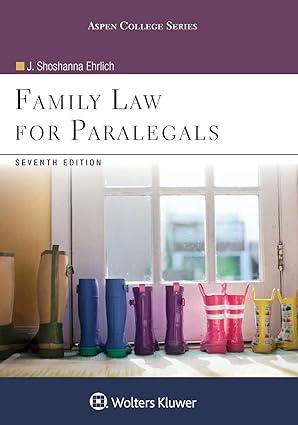This cause is before the court on rehearing, the wife having appealed from those portions of the
Question:
This cause is before the court on rehearing, the wife having appealed from those portions of the decree awarding a divorce to the husband and the sum of \(\$ 600\) per month as alimony to the wife pursuant to the terms of an antenuptial agreement between the parties. The three appellate judges each took a different position respecting the antenuptial agreement concerning alimony. Their respective views were (1) that the parties may validly agree upon alimony in an antenuptial agreement but that the trial court is not bound by their agreement; (2) that such an agreement is void as against public policy; and (3) that an antenuptial agreement respecting alimony is entitled to the same consideration and should be just as binding as an antenuptial agreement settling the property rights of the wife in her husband's estate upon his death. At the outset we must recognize that there is a vast difference between a contract made in the market place and one relating to the institution of marriage. It has long been the rule in a majority of the courts of this country and in this State that contracts intended to facilitate or promote the procurement of a divorce will be declared illegal as contrary to public policy. The reason for the rule lies in the nature of the marriage contract and the interest of the State therein. We know of no community or society in which the public policy that condemned a husband and wife to a lifetime of misery as an alternative to the opprobrium of divorce still exists. And a tendency to recognize this change in public policy and to give effect to the antenuptial agreements of the parties relating to divorce is clearly discernible. We have given careful consideration to the question of whether the change in public policy towards divorce requires a change in the rule respecting antenuptial agreements settling alimony and property rights of the parties upon divorce and have concluded that such agreements should no longer be held to be void ab initio as "contrary to public policy." If such an agreement is valid . . . and if, in addition, it is made to appear that the divorce was prosecuted in good faith, on proper grounds, so that, under the rules applicable to postnuptial alimony and property settlement agreements referred to above, it could not be said to facilitate or promote the procurement of a divorce, then it should be held valid as to conditions existing at the time the agreement was made.....
Questions:
1. According to the court, why have premarital agreements that set out the rights of spouses in the event of divorce generally been considered void as against public policy?
2. In thinking about whether to allow premarital agreements, how is the court influenced by the changing nature of marriage and divorce?
3. Does the court hold that all premarital agreements are valid? What may an agreement not do?
Step by Step Answer:






